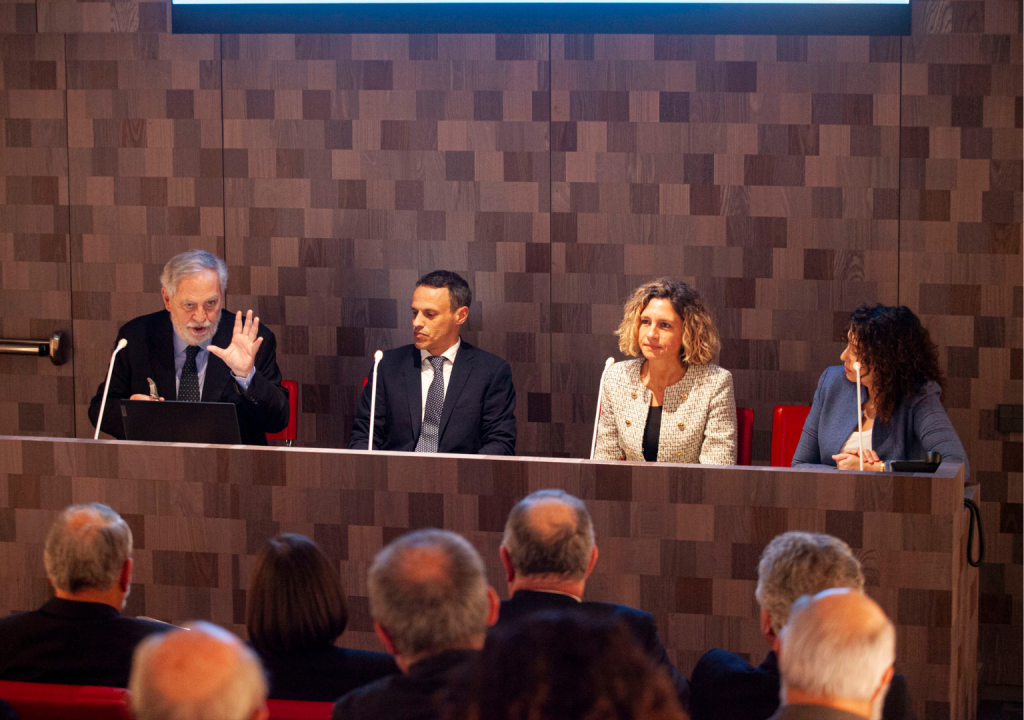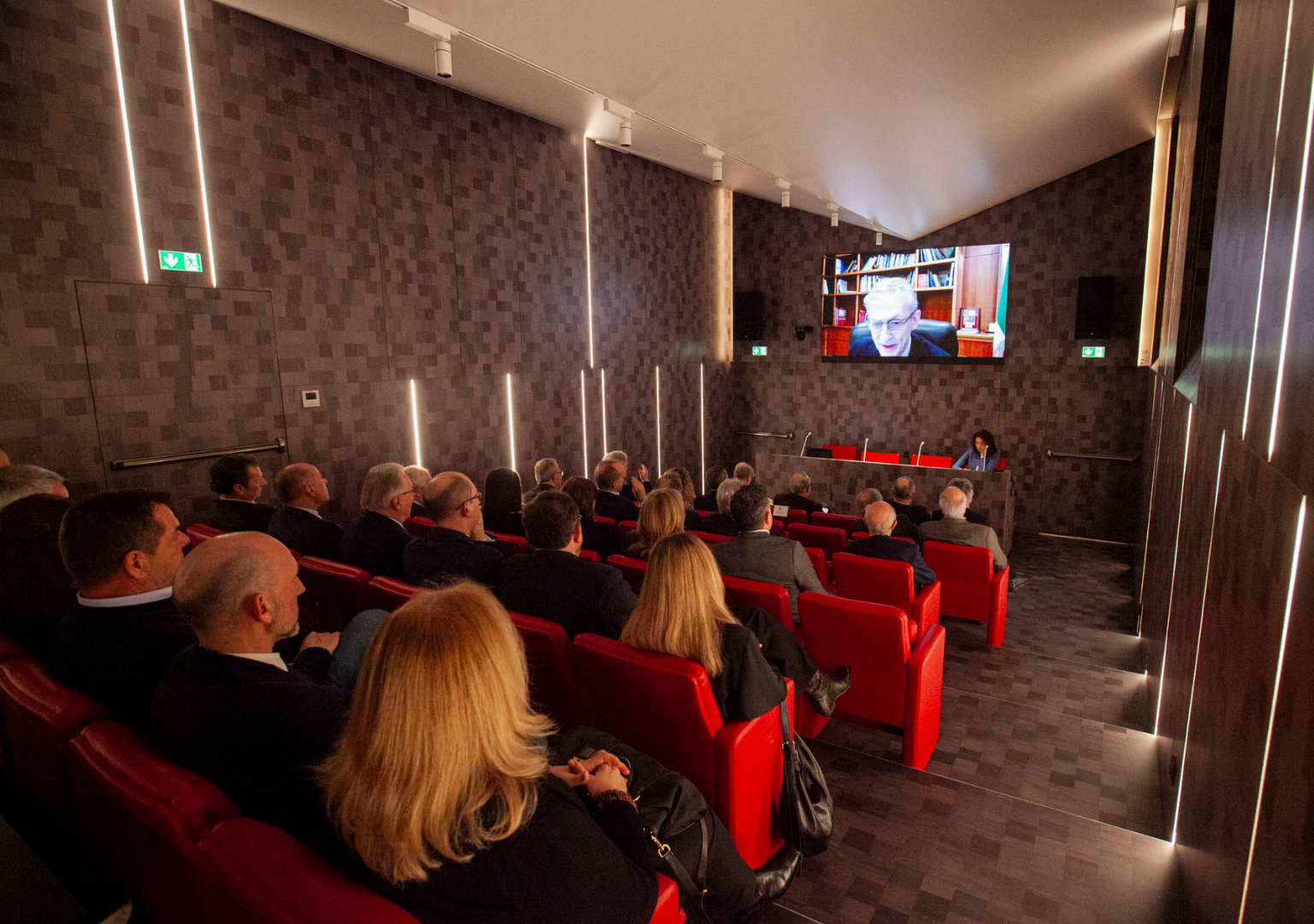MILK: a Friend or an Enemy?
12th February 2025 - Redefining the environmental footprint and the concept of quality in the dairy sector

On Wednesday, February 12, the conference entitled "MILK: a Friend or an Enemy?" was held at Palazzo Invernizzi Conference Centre. The event was organized by Fondazione Invernizzi in collaboration with IRCAF – Romeo and Enrica Invernizzi Agro-Food Reference Center of the Università Cattolica del Sacro Cuore. The conference featured speakers including Prof. Giuseppe Bertoni, President of Fondazione Invernizzi; Stefano Gatti, Minister Plenipotentiary and General Director for Development Cooperation at the Italian Ministry of Foreign Affairs and International Cooperation (MAECI); Prof. Lorenzo Morelli, Professor of Microbiology at Università Cattolica; Prof. Erminio Trevisi, Director of IRCAF and DiANA at Università Cattolica, along with Professors Claudio Bosio, Guendalina Graffigna, Vitaliano Fiorillo, Claudio Bandi and Paolo Ajmone Marsan.
A central topic of the conference was the new approach to calculating the environmental footprint of agri-food production, known as nutritional Life Cycle Assessment (nLCA). LCA refers to assessing a product’s environmental footprint throughout its entire life cycle. Innovation lies in the “n” factor, which introduces the nutritional aspect into the calculation. This approach was first adopted by FAO in 2021 when it was realised that a food’s nutrient density plays a pivotal role in determining its environmental footprint. According to this new FAO perspective, milk is considered as a low-impact food, contrary to previous beliefs. FAO research led to the significant conclusion that the long-standing perception of dairy products as environmentally harmful needs to be reconsidered. This stance is further supported by recent research conducted by IRCAF, which was established in 2020 with the support of Fondazione Invernizzi and in collaboration with three universities: Università Cattolica del Sacro Cuore (hosting the centre at its S. Monica Campus in Cremona), Bocconi University, and Milan Università degli Studi. Their study demonstrates that the nLCA of Italian dairy farms is even more favourable than FAO’s global average (obviously applying to global average values) and the concept of “quality” in the dairy sector needs to be refined and defined.
The conference started with opening remarks by Prof. Giuseppe Bertoni, President of Fondazione Invernizzi, who shared the foundation’s origins and the history of the Invernizzi spouses and their work in the Italian dairy sector. The President introduced the debate by emphasizing the importance of appreciating milk, which, as all other things, undoubtedly has aspects that deserve some attention, but research presented by IRCAF shows its many positive attributes. Regarding the impact of its production, he stated: “Without intensive production, there wouldn’t be enough food for everyone".
Stefano Gatti, General Director for Development Cooperation at MAECI and the Italian government’s special envoy for food security, joined remotely. He provided an international perspective to the debate, emphasizing Italy’s leadership in such area, at the request of the United Nations. Italy is one of the largest food producers and exporters. When it comes to nutrition, milk is an important topic, as are livestock farming and production, which are often the victims of negative myths and fake news. It is important to return to scientific truth thanks to reports issued by FAO and research such as that carried out by IRCAF, to protect the Italian system, which not only operates within national borders but is also involved in developing countries to support food security projects, especially in Africa, through cooperation.
Prof. Lorenzo Morelli introduced IRCAF’s research, focusing on the role of consumers, who are often overwhelmed by conflicting and misleading information. “This conference and IRCAF study stem from the need to address these issues”, he stated. The research addressed various questions from an interdisciplinary perspective. When it comes to consumers, the perception of milk quality analysed from a psychological point of view and economic and animal health factors are important. This is why three Milan universities (Bocconi, Cattolica and Statale) have been involved to conduct a comprehensive analysis from different viewpoints.
Prof. Erminio Trevisi, Director of IRCAF and the DiANA department at Università Cattolica, pinpointed the conference central theme, by presenting data on the environmental footprint of the agri-food sector, emphasizing decreased emissions and the importance of the nLCA method in assessing milk sustainability. IRCAF’s research proves that Italian dairy farms have a lower environmental impact than FAO’s global average, which reinforces the need to refine the concept of quality in the dairy industry.
Following introductory remarks, roundtable discussions were held that provided valuable insights.
The social representation of “milk quality” by consumers, especially in relation to social media communication in Italy, is the topic addressed by Claudio Bosio, member of IRCAF Steering Committee and President of the Scientific Committee of the UC “EngageMinds Hub” research centre, co-director of social research on “milk quality”, and Guendalina Graffigna, Full Professor of Consumer and Health Psychology, Director of the EngageMinds HUB Research Centre, at Università Cattolica del Sacro Cuore and co-director of social research on “milk quality”.
Data is transformed in the mind of consumers, who attribute a meaning to the data and information they receive, according to professors. Milk has a strong symbolic and ancestral value and is an emotional symbol that lends itself to interpretation and distortion. It is therefore important to find a point of exchange and listening with consumers, who are often influenced by debates on social media stemming from misinterpretation of data.
Vitaliano Fiorillo, Director of Invernizzi AGRI Lab, tackled the question, "Is milk production sustainable?“. “It is, - said Fiorillo - but only under certain conditions”. Today there is an issue of competitiveness of Italian dairy farms. On average, companies producing high-end products have higher prices and higher profitability than those that are not part of these consortia. However, in general, even a slight drop in prices is sufficient to lead all of them to suffer. This is due to the fact they all have to make constant investments (including for sustainability) in technology to keep up and they all are highly indebted. This situation cannot change and can only become more complex, therefore managerial skills are needed to set up a strategy, have flexibility and control management finances, all of which are largely lacking today, even in large companies.
Prof. Claudio Bandi Full Professor at Milan University, has conducted research on zoonotic diseases (infections transmitted from animals to humans), epidemiology, the evolution of infectious agents, the evolution of infectious agents and the development of new therapeutic, diagnostic and vaccination strategies. In his speech, he presented the results of a study comparing different types of cattle farming for milk production (conventional, organic, extensive, intensive) in relation to the circulation of infectious agents and antibiotic resistance, with reference to farm management as a factor in animal health.
Prof. Paolo Ajmone Marsan, Full Professor of Genetic Improvement at the Faculty of Agriculture at Piacenza Università Cattolica del S. Cuore and Director of the AGRISYSTEM Agribusiness System PhD School and Romeo and Enrica Invernizzi Research Centre for Sustainable Dairy Production (CREI) at Università Cattolica, concluded the debate by reviewing traditional and emerging criteria for milk quality assessment and confirmed that, according to our genome, milk is a beneficial food for our health.
The event was attended by academics, journalists, industry and agri-food organizations, associations and foundations.
This initiative is part of Fondazione Invernizzi’s planned activities, facilitated through the establishment of the Conference Centre at Palazzo Invernizzi. Indeed, the Foundation is committed to organizing and fostering cultural and scientific outreach activities.

















